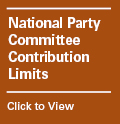In recent months, aggregate political contribution limits have been the subject of dramatic change due to the McCutcheon decision as well as significant legislative modifications in the federal budget bill. Meanwhile, pay-to-play restrictions continue to expand at the federal level, with proposed rules covering municipal advisors as well as third-party and affiliated placement agents. Additionally, at least a half-dozen significant cases are pending that have the potential to further impact campaign finance and pay-to-play rules. Corporations should continue to monitor these changes and refine their compliance programs accordingly.
Aggregate Limits on the Way Out?

The U.S. Supreme Court's April 2014 decision in McCutcheon v. Federal Election Commission, 134 S.Ct. 41 (2013), struck down the aggregate limits imposed on individual political contributions under federal law. Many state and local jurisdictions also impose aggregate limits on individual, political action committee (PAC) and/or corporate contributions. In the aftermath of the McCutcheon decision, several states and localities have taken steps to eliminate aggregate limits.
Two legal challenges to state aggregate limits already are moving forward in court. In Minnesota, a judge temporarily blocked enforcement of the state’s unique system of aggregate limits; and in Wisconsin, after a federal district court judge permanently enjoined the state from enforcing its aggregate contribution limit imposed on individuals, the state's Government Accountability Board released a statement explaining that, pursuant to the court's order, it will no longer enforce the aggregate annual limit. Maryland voluntarily decided to not implement its aggregate limits while these cases play out. The attorney general for the District of Columbia asked the city council to repeal the district's aggregate contribution limit. Connecticut, Kentucky, Los Angeles, Maine and New York state announced they will no longer enforce their aggregate limits on individual contributors. Massachusetts passed a bill that repealed the state's aggregate contribution limit for individuals on August 1, 2014. The state's annual aggregate limit on political party contributions remains in effect. These developments are only a portion of the activity that has taken place at the state and local levels since McCutcheon, and further developments are expected in 2015.
Higher Limits on National Party Committee Contributions
On December 16, 2014, President Obama signed into law — as part of the $1.1 trillion budget package — amendments to the Federal Election Campaign Act, increasing the amount an individual or PAC may contribute to a national party committee (e.g., Republican National Committee, Democratic National Committee, National Republican Senatorial Committee, Democratic Senatorial Campaign Committee, National Republican Congressional Committee and Democratic Congressional Campaign Committee). In particular, the amendments allow increased contributions to certain designated accounts established by such national parties. In early 2015, the FEC is expected to announce increased contribution limits for individual contributions for the 2015-16 election cycle. As a result, the amount that individuals may contribute to these accounts will further increase. Without the aggregate limits that had been in place prior to McCutcheon, individuals are now able to contribute $777,600 per national party committee per year.
Continued Expansion of Pay-to-Play Rules
Interestingly, pay-to-play rules continue to expand at a time when campaign finance limits in general are becoming more generous. Pay-to-play rules, which marked their 20th anniversary in 2014, restrict or prohibit political contributions made by covered employees of companies that have, or attempt to obtain, government contracts. These laws cover activity at the federal, state and local levels. The latest wave of federal pay-to-play rules includes Securities and Exchange Commission Rule 206(4)-5 covering investment advisers, Commodity Futures Trading Commission Rule 23.451 covering swap dealers, and, most recently, proposed amendments to Municipal Securities Rulemaking Board Rule G-37 that would expand coverage from broker-dealers to municipal advisors as well as a proposed Financial Industry Regulatory Authority pay-to-play rule for third-party and affiliated placement agents.
Significant cases are pending with the potential to impact the pay-to-play arena. Wagner v. FEC, for example, could throw out a statute prohibiting federal contractors from making contributions to individual candidates and parties. A case on appeal, the New York Republican State Committee v. SEC, challenges aspects of SEC Rule 206(4)-5 that imposes pay-to-play restrictions on investment advisers.
Continued Refinement of Compliance Programs a Must for Corporations
Because of the ever-increasing risk of enforcement actions, broadening shareholder scrutiny, and negative publicity that may cause adverse economic and reputational consequences, corporations in virtually every industry continue to develop and refine compliance programs to address laws regulating government affairs and government procurement activities. Common elements among these programs include implementing tailored policies, preclearing certain activities, providing protocols to ensure registration and ongoing reporting requirements are met, training programs for certain officers and employees, and procedures for keeping abreast of the latest developments in this area of law.
This memorandum is provided by Skadden, Arps, Slate, Meagher & Flom LLP and its affiliates for educational and informational purposes only and is not intended and should not be construed as legal advice. This memorandum is considered advertising under applicable state laws.
